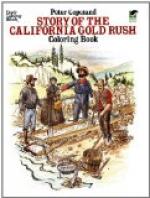Some of the “sand bars,” or banks of gravel and earth, washed down by the Yuba River were so rich that the men could pick out a tin cupful of gold day after day for weeks. One place was called Tin-cup Bar for this reason. Spanish Bar, on the American River, yielded a million dollars’ worth of dust, and at Ford’s Bar, a miner, named Ford, took out seven hundred dollars a day for three weeks. At Rich Bar, on the Feather River, a panful of earth gave fifteen hundred dollars.
Yet the miners were seldom satisfied, but were always prospecting for richer claims. A man would shoulder his roll of blankets, his pick and shovel, with a few cooking things, and start off hoping to find some rich nugget, leaving a fairly good claim untouched.
The most extravagant prices were charged the miner for everything he had to buy. Ten dollars apiece for pick and shovel, fifty more for a pair of long boots, with bacon and potatoes at a dollar and a half a pound, soon took all his gold-dust to pay for. A dozen fresh eggs cost ten dollars, and a box of sardines half an ounce of gold-dust, which was eight dollars. There was no butter to buy, for any milk was quickly sold at a dollar a pint. The hotels charged three dollars a meal, or a dollar for a dish of pork and beans, and a dollar for two potatoes.
Lumber cost a dollar and a half a foot, but carpenters would not build houses when they could make fifty dollars a day by mining. As there was no lumber for the cabin floors, the ground was beaten hard and really made a good floor. In Placerville the houses were built along the bed of a ravine, and in sweeping these earthen floors some one saw gold-dust glittering, and found that rich diggings were under foot. Thereupon many of the miners dug up their cabin floors, and one man took about twenty thousand dollars in nuggets and gold-dust from the small space his cabin covered.
Very few women and children came to the mines in early days, and the first white woman to arrive in a camp had all sorts of attentions. Sometimes the town was named for the woman first in the place as Sarahsville and Marietta. If a lady visited a mining-camp, the men far and near would drop work and come in just to look at the visitor. One lady, who sang for the miners on her arrival in their town, was given about five hundred dollars’ worth of gold-dust.
A child was a great curiosity, and any pretty little girl was sure to have a collection of nuggets or a quantity of gold-dust presented to her. The theatre and circus companies who visited mining-camps soon found out that a little child who could sing or dance was a great attraction. The miners used to throw a shower of money or nuggets at the feet of such little favorites as we throw flowers now.




